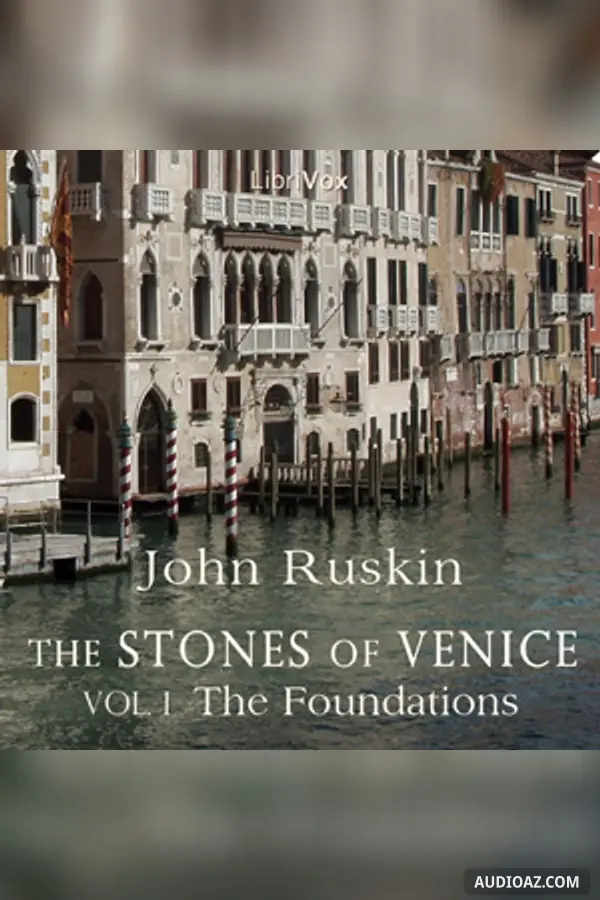
The Stones of Venice, Volume 1 - Audiolibro Gratis
Autor(es): John Ruskin
Idioma: English
Género(s): Arte, diseño y arquitecturaNo ficciónViajes y geografía
1 / 36Preface
- 1. Preface
- 2. Chapter 01, The Quarry, part 1
- 3. Chapter 01, The Quarry, part 2
- 4. Chapter 01, The Quarry, part 3
- 5. Chapter 02, The Virtues of Architecture
- 6. Chapter 03, The Six Divisions of Architecture
- 7. Chapter 04, The Wall Base
- 8. Chapter 05, The Wall Veil
- 9. Chapter 06, The Wall Cornice
- 10. Chapter 07, The Pier Base
- 11. Chapter 08, The Shaft
- 12. Chapter 09, The Capital
- 13. Chapter 10, The Arch Line
- 14. Chapter 11, The Arch Masonry
- 15. Chapter 12, The Arch Load
- 16. Chapter 13, The Roof
- 17. Chapter 14, The Roof Cornice
- 18. Chapter 15, The Buttress
- 19. Chapter 16, Form of Aperture
- 20. Chapter 17, Filling of Aperture
- 21. Chapter 18, Protection of Aperture
- 22. Chapter 19, Superimposition
- 23. Chapter 20, The Material of Ornament, part 1
- 24. Chapter 20, The Material of Ornament, part 2
- 25. Chapter 21, Treatment of Ornament, part 1
- 26. Chapter 21, Treatment of Ornament, part 2
- 27. Chapter 22, The Angle
- 28. Chapter 23, The Edge and Fillet
- 29. Chapter 24, The Roll and Recess
- 30. Chapter 25, The Base
- 31. Chapter 26, The Wall Veil and Shaft
- 32. Chapter 27, The Cornice and Capital, part 1
- 33. Chapter 27, The Cornice and Capital, part 2
- 34. Chapter 28, The Archivolt and Aperture
- 35. Chapter 29, The Roof
- 36. Chapter 30, The Vestibule
Acerca de
The Stones of Venice is a three-volume treatise on Venetian art and architecture by English art historian John Ruskin, first published from 1851 to 1853. Intending to prove how the architecture in Venice exemplified the principles he discussed in his earlier work, The Seven Lamps of Architecture, Ruskin examined the city in detail, describing for example over eighty churches. He discusses architecture of Venice's Byzantine, Gothic and Renaissance periods, and provides a general history of the city as well. The book aroused considerable interest in Victorian Britain and beyond. The chapter "The Nature of Gothic" (from volume 2) was admired by William Morris, who published it separately in an edition which is in itself an example of Gothic revival. It inspired Marcel Proust; the narrator of the Recherche visits Venice with his mother in a state of enthusiasm for Ruskin. The Stones of Venice is considered one of the most influential books of the 19th century. (Summary adapted from the Wikipedia by Leni)
Comentarios
Sé el primero en comentar
Aún no hay comentarios sobre este contenido. ¡Inicia la conversación!
Descubrir Más
Etiquetas: The Stones of Venice, Volume 1 audio, The Stones of Venice, Volume 1 - John Ruskin audio, Arte, diseño y arquitectura audio, No ficción audio, Viajes y geografía audio, free audiobook, free audio book, audioaz






